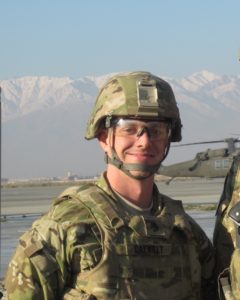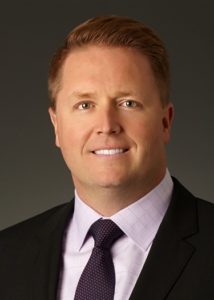Monday is a special day for John Daywalt. Having passed the Texas bar exam, he’s being sworn in as a corporate attorney for Vinson & Elkins. But it’s also special for another reason: It’s Veteran’s Day, and John Daywalt is a veteran.
While the timing is unusual, the presence of veterans like Daywalt is not. And as the Gulf War Era grinds on, veterans are growing in numbers and influence, particularly in Texas.

At the end of 2017, Texas ranked behind only California in veteran population, according to the U.S. Department of Veterans Affairs. By 2027, Texas is expected to rank at the top. In 2016, the number of Gulf War Era veterans nationwide surpassed the numbers of Vietnam Era veterans for the first time, heralding a new generation of men and women who have military service on their resume.
Aaron Rigby, a corporate partner at Sidley, is one of them. A graduate of the U.S. Naval Academy, Rigby is part of that newer cohort that regards military service as a matter of civic responsibility, even without the mandate of a draft.
After his graduation from the Naval Academy with a degree in economics, Rigby spent five years on active duty, much of it involved in amphibious ready group (ARG) mission planning, including two tours in the Middle East.
In October 2000, he was aboard the USS Anchorage off the coast of Australia when 17 sailors were killed in the Al-Qaeda bombing of the USS Cole off the coast of Yemen. The Anchorage steamed to Yemen and remained there in support of the Cole during the ensuing investigation.
He was deployed to the Pacific Fleet after September 11, 2001, where he was a member of the strategic planning team that helped guide the first troops into Afghanistan.
But like many veterans, Rigby had his eye on life after the Navy.
“I knew the Navy wasn’t going to be a career. I started applying to law schools even before I got out,” he said.

After his release, the Richardson Berkner High School grad returned to Dallas to attend law school at Southern Methodist University, where he graduated in 2007.
At Sidley he gravitates to the transactional side of corporate for clients like Genentech, Hunt Realty, Dell and Roche Molecular Systems. But as a member of the firm’s pro bono committee he finds himself applying his legal skillset to a broad array of organizations that serve the needs of veterans, particularly those transitioning from the experience of war into the more prosaic but equally challenging disciplines of civilian life.
“It’s an easy source of pro bono,” says Rigby. “There’s a big need for help in really difficult times.”
Rigby is on the board of Carry The Load, a Dallas-based organization that creates events to educate the public and raise funds, much of it for distribution to other veterans’ organizations. He also lends his high-priced organizational and governance skills to pro bono organizations to help them navigate the increasingly complicated non-profit environment for the benefit of military veterans and first responders.
“Where I can I help staff legal clinics, and I find it easy to use the skillset that I have for a variety of organizations with differing missions,” Rigby said.
The needs, he says, range from the obvious to the subtle.
“The most obvious need is in the area of mental health,” said Rigby. “War takes a toll, I’ve seen it in some of my friends who’ve not been as lucky as I have. There’s a tremendous need for more funds to increase awareness, as well as treatment.”
“But we also want to help in the area of re-integration into the workplace. These are people with incredible talents that are being overlooked by employers. Their specific work experience may not fit directly into a specific job, but they have incredible intangibles – the problem solving and work ethic – that employers are looking for,” Rigby says.
Which brings us back to John Daywalt for whom the transition has been better than most.
Daywalt grew up in Copperas Cove near Killeen where his father retired after a career in the Army that included two tours in Iraq. So it wasn’t out of step for the younger Daywalt to be involved in the Army National Guard while he went to college. After basic training he joined the infantry and volunteered for AirBorne training at Fort Benning, Ga., before returning to school.
He was in his sophomore year when he was called to active duty in November 2011 and spent the next two years in in Afghanistan. He served as a paralegal at Camp Phoenix near Kabul helping with investigations involving interpretations and violations of the Uniform Code of Military Justice.
He left the Army with the rank of sergeant and returned to school. He graduated from the University of Texas in December 2014 and headed to law school at Vanderbilt.
As he becomes a newly-minted lawyer for Vinson Elkins on this Veterans’ Day, Daywalt, 27, sees himself not as a student who had to set aside his ambitions to serve, but as a lawyer who has been enhanced by the experience.
“In some ways the transition (back to school) was difficult. My friends were already gone,” says Daywalt.
“But the experience gave me the right work ethic and a greater sense of what’s important and what’s not important, not to mention a greater appreciation for the luxuries we have,” Daywalt says. Moreover, he says veterans learn how to handle themselves in a mission-oriented environment, something he thinks will help him in his new law firm workplace.
He says Vinson & Elkins has been extraordinary in its recognition of veterans within the firm, and he’s looking forward to building a new career as a corporate lawyer.
Does he miss anything about military life?
“I think there was a great camaraderie. I enjoyed meeting people from all walks of life,” Daywalt says. “I think some of that is missing in life these days.”
Perhaps as the new generation of veterans continues to reintegrate that will be less the case.
